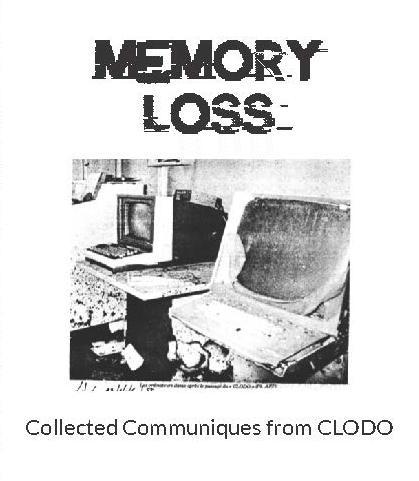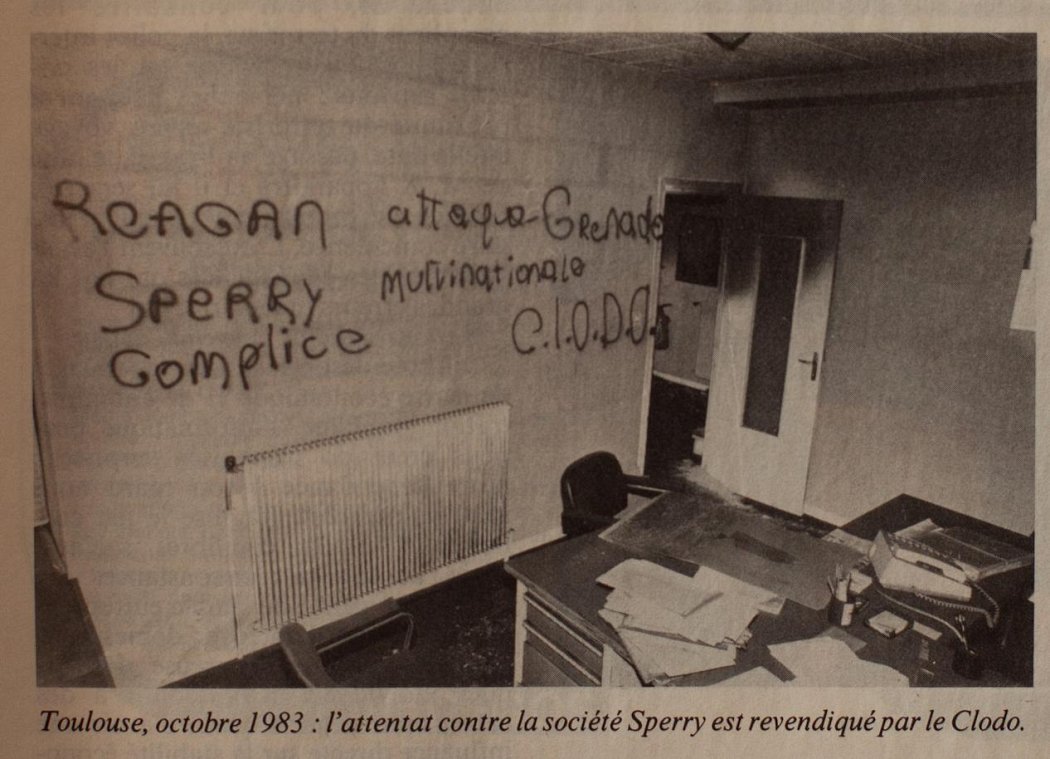
PDF: Memory Loss
For Mutual Aid & Solidarity

PDF: Memory Loss
Machines in Flames (2022, 50min) finds a secret history of destruction by following the footsteps of a clandestine group of French computer workers from the 1980s.
In 1980s Toulouse, an elusive group began bombing computer companies. ‘CLODO’ disappeared after three years, without ever being caught or ever to be heard of again. Two film makers launch an investigation into CLODO, looking for answers, motivations and identities, but are soon frustrated by a collective that struck in the dead of night, leaving in their tracks only ashes and the sporadic line of cryptic graffiti. The film combines archival traces, a viral desktop choreography, and late-night video recordings of CLODO’s targets into a meditation on computation, destruction, and the lure of archives.

Transhumanism: the ideology of the techno-world
Silvia Guerini and Costantino Ragusa – Resistenze al nanomondo
A chapter from the book: Silvia Guerini and Costantino Ragusa, The ideology of the techno-world. Resisting the megamachine, acro-pólis, 2024.
We will soon publish an English translation of the entire book on our website: Resistenze al nanomondo, www.resistenzealnanomondo.org
“The goal of transhumanism is precisely to replace the natural with the planned”1.
James Hughes
From the First Industrial Revolution, we have come to define technological developments since the 21st century as the Fourth Industrial Revolution. Developments made possible by information technology that characterised the Third Industrial Revolution. In our view, defining the developments of the converging techno-sciences as a Fourth Industrial Revolution is somewhat reductive. First of all, this definition refers to a purely industrial process when the current transformations concern life itself. We do not have a transformation of a factory system that then has consequences for society as a whole, but we have from the very beginning a process that insinuates itself into society and into people’s existence. We are not confronted with developments that simply result from previous technical innovations, but we are confronted with a precise idea of the human being that can be realised thanks to the techno-sciences that can now extend into every dimension, penetrating right into bodies and life processes. Even advances in Artificial Intelligence, for example, do not stem from some new technological innovation, but from more powerful computers, more efficient algorithms and above all more available data.
Techno-sciences become a system, they become a horizon of meaning, they become the context of people’s existence, they become inevitable. They cannot be considered as technologies that fit into every sphere of society, leaving the possibility of using them or not, allowing a dimension of autonomy with respect to them. Once inserted, they become the environment itself, merging with it, shaping and transforming it according to their characteristics and according to the transhumanist ideology they carry. In doing so they become the new normal by shaping and transforming being-in-the-world, perceiving themselves in the world, being in the world and acting in the world. Ultimately transforming the human being.
It can be understood how in itself techno-sciences are not neutral: ‘what we consider the neutrality of technology is only our neutrality with respect to it’2.
The endless debate around their neutrality and their positive or negative use could end around the simple consideration that the harmful consequences cannot be considered as side effects: as far as genetic engineering technologies and nanotechnology are concerned, these are always announced disasters that among other things serve to speed up and normalise other steps.
Just as the atomic scientists observing the results of their tests on the inhabitants of the Bikini atolls did not have before their eyes side effects, but the very manifestation of nuclear research, the researchers developing gene editing with CRISPR/Cas9 do not have before their eyes the disappearance of DNA fragments and transmissible genetic modifications as undesirable effects, but the very possibility of intervening in the evolution of living beings.
Just as a tunnel effect microscope is not a simple instrument, but presupposes a world in which matter is manipulated at the nanoscale, techno-sciences presuppose a world in which the living becomes mere matter to be engineered and redesigned, in which every phenomenon is controlled in order to direct its direction and evolution. Human beings included.
The issue is much more radical than a debate reduced and flattened to utilities, advantages, disadvantages, risks, dangers, the reflection should be taken a little further, out of their realm of quantity, out of their mechanism, out of calculations and predictions to arrive at the radical questioning of the conception that sees the living as a machine. In this conception, only what can be measured and analysed has value, and it is this that becomes the real. But what will come out of tables, diagrams, models, enclosures, laboratories, test tubes and slides will be a minced, simplified, impoverished, degraded real. Nothing compared to the love with which Alfred Russel Wallace observed the bird of paradise in the forest of New Guinea or with which Jean-Henry Fabre spied the comings and goings of a beetle in Provence. That kind of science has disappeared, precisely because a Fabre behind the flattery of the academic world and the great scientific institutions made Victor Hugo’s words his own: ”I hate the stench of death from laboratories”, referring to vivisection on animals practised as profusely in his time as still today.
If a living being is conceived as a machine, one cannot get to know it through simple observation in its environment, it becomes necessary to break it down into its parts. ”It is in this light that one can understand why scientists think it is possible to learn more about life by cutting a frog open in a laboratory than by sitting by a pond observing frogs and fish, mosquitoes and water lilies living together”3. Modern science with its quantitative and utilitarian approach already had in its assumptions the dissection and manipulation laboratory. Continue reading “Transhumanism: the ideology of the techno-world”
After the fall of Fascist Germany, the creation of another totalitarian regime should have been made impossible. The goal was to have a democratic, world society, made up of free, equal and emancipated human beings. Global computer networks, mirrors of reality, which would be accessible to all, would make this dream possible. The euphoria for new, emerging technologies fuelled their hopes. With Cybernetics, System theory and Constructivism being their bibles, they thought of the human brain as an information processing system, which hence could be connected to similar electronic systems.
In personal interviews, this film tells their story, which is also the tale of the birth of the Internet.
It also tells the story of the traitor. The man from within their midst, who decided to turn his back on their utopia; who left the machine and tried to bring it down.
In the early hours of Tuesday, January 10, far from assembly fanfare, a van at the University of Lugano was attacked with fire in solidarity with fellow anarchist Alfredo Cospito who has been on hunger strike for 83 days.
The choice of the faculty was not accidental, in fact the complex that was attacked houses classrooms and offices of the Faculty of Computer Science (www.inf.usi.ch) of the Faculty of Biomedical Sciences (www.biomed.usi.ch/it), the Department of Innovative Technologies of SUPSI (www.supsi.ch/dti/) and the Dalle Molle Institute of Artificial Intelligence Studies (IDSIA)(www.idsia.ch).
Against the increasingly deadly future proposed by society and civilization, the only viable path is that of attack.
Strength Thanos Chatziangelou
Strength Ivan Alocco
Strength to all imprisoned Anarchists and imprisoned revolutionary fighters
A warm greeting to those who find themselves birds of the forest
May this little hearth warm you
Long live Anarchy
Long live the Black International
Death to the technoworld
Source: Inferno Urbano

Fanzine and review of the documentary on CLODO (Committee for the Liquidation or Destruction of Computers)
A documentary delves into the mystery surrounding a group of anonymous activists who carried out a series of arson attacks in Toulouse in the 1980s.
In the 1980s, the French city of Toulouse was home to a number of companies that used computers to further the aims of France’s police and military-industrial complex. These companies, such as Sperry Univac – a major U.S. equipment and electronics company – were among the first to create digital surveillance systems and manufactured products that would make warfare easier for the state by improving the accuracy of missiles.
In addition to housing these private military companies, Toulouse was also home to a milieu of radicals, including Spanish anti-fascists fleeing Franco; Action Directe guerrillas; and a new left forged in the aftershocks of May 1968, when students and workers staged a series of strikes that rejected the authority of the ruling Gaullist party and the orthodox Marxism of the French Communist Party.
It was in this context that an activist group called the Committee for the Liquidation Or Destruction of Computers (CLODO) emerged, which carried out several arson attacks against computers of military technology companies in Toulouse during the 1980s. Not much is known about CLODO. It disappeared completely after committing some six successful and two unsuccessful attacks against technology companies, leaving satirical communiqués as the only proof of its existence.
An introduction to the translation of one of its communiqués suggests that the group may have emerged from a citywide coalition to prevent the construction of the Golfech nuclear plant on the local Garonne River. In 1981, when this movement reached a stalemate, some participants resorted to an intensive campaign of sabotage. CLODO, who claimed to be computer workers, may have taken this sabotage impulse and applied it to computers, which in their view were “the preferred tool of the rulers. They are used to exploit, file, control and repress”. Continue reading “CLODO (…when matches were the “off” button)”